Let’s talk about some critical B2B marketing metrics. We like to call these key performance indicators (KPIs).
Clients are always asking us: “How do you qualify a conversion? What do you consider a conversion?”
Today, we’re going to go over 9 B2B marketing KPIs that are best for your business, what these metrics mean, and which ones we care about most here at Directive.
Learn/retain more by reading? We got you. Here’s the video above in blog format. You’re welcome.
3 Categories of B2B Marketing KPIs
Let’s cover three groups of B2B marketing KPIs:
- Overall KPIs
- Organic KPIs or SEO KPIs
- Pay-per-click or advertising KPIs
Let’s dive in.
Overall KPIs
When it comes to overall B2B marketing KPIs, there are three things that most B2B marketers should care about:
- Opportunities
- Customer cash
- Conversions
Opportunities
At Directive, we put high importance on measuring ROI. Our clients receive their own Directive Dashboard that is synced with campaign data and their CRM to be able to attribute the impact marketing is having on their business objectives.
A lot of our competition, our industry, and many in-house marketers are still relying on conversions to determine if their campaigns are succeeding or not. While conversions are one of the three metrics we care about, they’re not more important than opportunities.
Opportunities are conversions that sales have accepted. These are opportunities that you have proposals with. These are people who you’re hoping and planning on closing who are part of your sales CRM.

If you’re in marketing, your critical and most important metric to focus on should be opportunities.
Don’t have a system to track opportunities within the channel that it came from? We’d love to chat with you and introduce you to our closed-loop analytics system. This system allows you to depict the value of your campaigns and help align you with your sales team.
This way, the whole organization can appreciate the value you create, and you inform them of the value you create for the client.
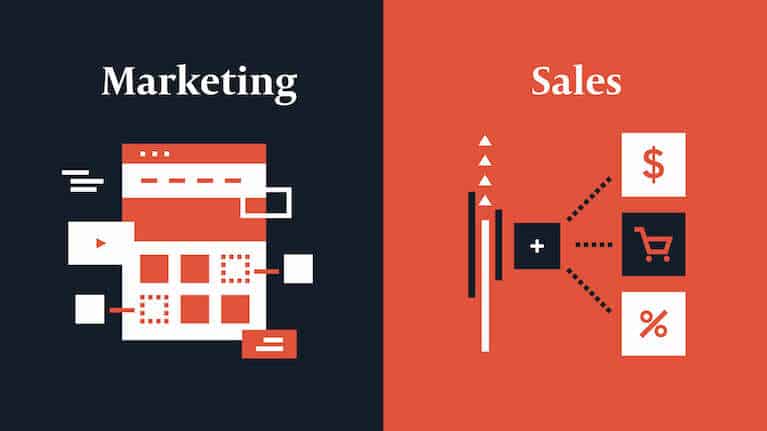
Customer Cash
Customer cash is a metric most marketing people wouldn’t consider. We define customer cash as the money you make or lose from your existing portfolio.

Every month, we measure:
- If a client leaves us, how much money is left in their monthly contract?
- If we get a new client from a referral or an upsell, how much money have we gained?
What it lets us do is see how our people and our customers who are paying us are either driving or taking away from our growth.
This is a significant one for B2B marketers to focus on. If you’re not thinking about retention as part of your marketing campaigns, then you’re not focusing on what is frequently the biggest driver of revenue growth:
- Retention
- Upsells
- Referrals
As B2B marketers, focus on customer cash. It’s a critical metric for your business!
Conversions
Lastly, not all marketers in the B2B space have a full marketing CRM or a robust sales CRM they can track opportunities with. If that’s the case, then focus on conversions. Conversions are still an important metric to follow. However, you do want to get past conversions and dive into opportunities.
If you are tracking conversions, it’s an excellent way to see:
- How many form-fills you’ve received and from what channels
- How many phone calls were made and from what channels
- How many people chatted with you
You’ll want to be able to track your bottom and top-of-funnel conversions. These conversions are people who:
- Subscribed to your newsletter
- Joined your webinar
- You’ve had marketing interactions with
It’s imperative you distinguish the top and middle-of-funnel conversions from the bottom. It can be misleading to report on all conversions if they aren’t specifically bottom of the marketing funnel.
Be sure to segment and label them accordingly. You want to depict the value you create as a marketer accurately!
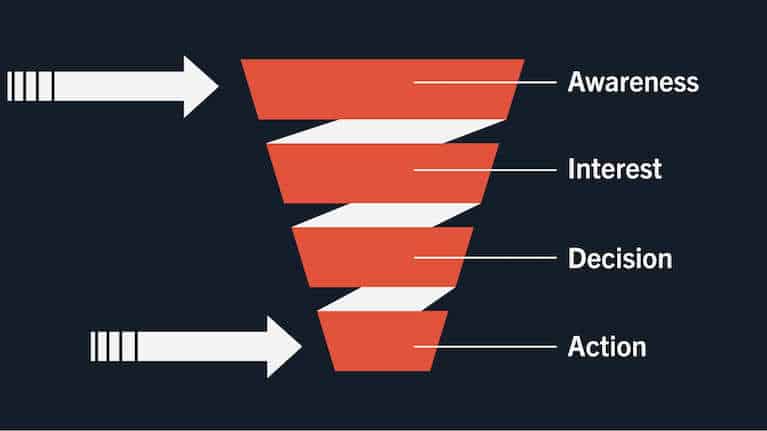
Organic KPIs
When working with B2B companies, which organic B2B Marketing KPIs do you care about most?
Focus on:
- Organic traffic cost
- Keywords in the top 5
- Referring domains
Organic Traffic
There are other basic B2B Marketing KPIs, but keep an eye on the ones you could be tracking through third parties. Caution, these are less evident in your Google Analytics.
Organic traffic value is a metric by SEMrush. It takes your estimated click-through rate for the position you rank for a keyword, plus the average customer click. It then calculates how much you would pay for that keyword if you didn’t rank organically and wanted to drive the same traffic from a PPC ad.
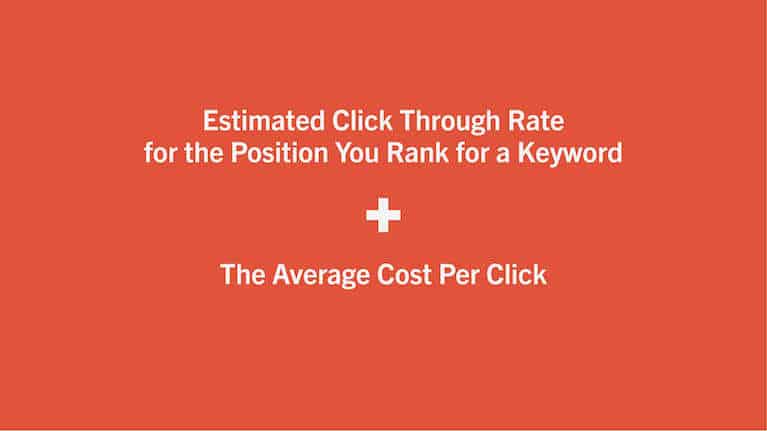
This is a critical metric because SEO can often be devalued, compared to advertising and other channels that are easily trackable. Organic traffic value can start putting SEO on a similar playing field. Because of this, you can compare yourself to competitors and use it as a comparative metric from where you’re at today.
Keywords in the Top 5
You know that the lion’s share of clicks from an organic results page come from results in the top five. So, it’s vital you’re not just reporting on all keyword rankings because not all keyword rankings are created equal; they’re just not the same.
The reality, keyword rankings shouldn’t be your number one metric. They should still be:
- Opportunities
- Customer cash
- Conversions
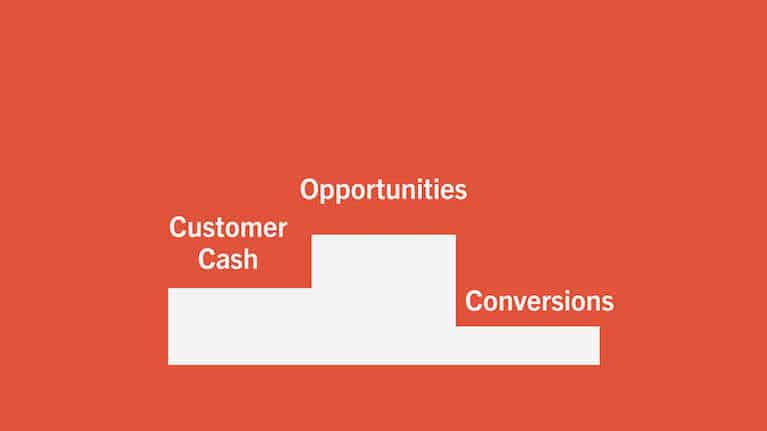
But as an SEO-specific recommendation, keywords in the top five spots are leading indicators of keywords that could potentially drive business results.
Why?
The click-through rate, search volume, and brand fit are all on point!
Referring Domains
Lastly, focus on referring domains. We know that there are three core drivers of SEO success:
- Having a technical foundation
- Having the best information in your vertical
- Being the most authoritative in your vertical
So, in marketing language, we need to look into
- Technical SEO
- Content marketing
- Digital PR
At Directive, we track:
- How many referring domains we’re building for our clients
- How many new links are authoritative and relevant
Referring domains are a critical metric to measure. To do this, we use various tools including:
- Majestic — a massive index
- Moz — smaller link index and is more focused
- Ahrefs — an extensive and quality index
You can draw correlations between increasing referring domains and what happens to your opportunities. Also, you can start to see correlations between building links, organic traffic value, keywords in the top five, and opportunities to then make a case of value.

Advertising KPIs or Pay-Per-Click KPIs
When it comes to advertising KPIs or PPC KPIs, there are three you should prioritize:
- Cost-per-acquisition
- Conversion rate
- Search impression share
All three B2B Marketing KPIs are critical for B2B marketers to understand.
Cost-Per-Acquisition
Cost-per-acquisition allows different channels and mediums to be put on a level playing field.

We see vast differences between cost-per-conversion and cost-per-opportunities. This is why we spent time and money building a closed-loop analytics system.
We’ve seen $20 differences in cost-per-conversion, but $1,000 differences in cost-per-opportunities.
For you, it’s critical to uncover which channels are driving opportunities and then compare cost-per-opportunity and cost-per-acquisition. From there, you can adequately allocate time, resources, and budget in the right areas.
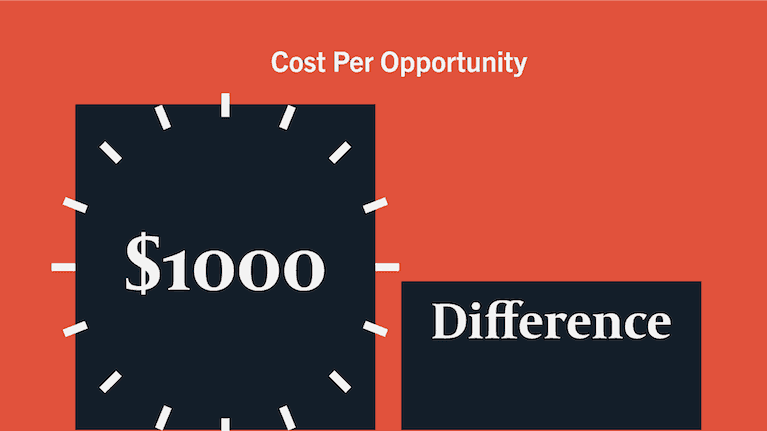
Conversion Rate
The conversion rate can be an indicator of where you need to focus. If you have one keyword converting exponentially higher than others, it’s time you ask yourself:
- Is that because you have a better answer for this search intent?
- Is this because of how your product or service is positioned?
- Is this because of your landing pages?
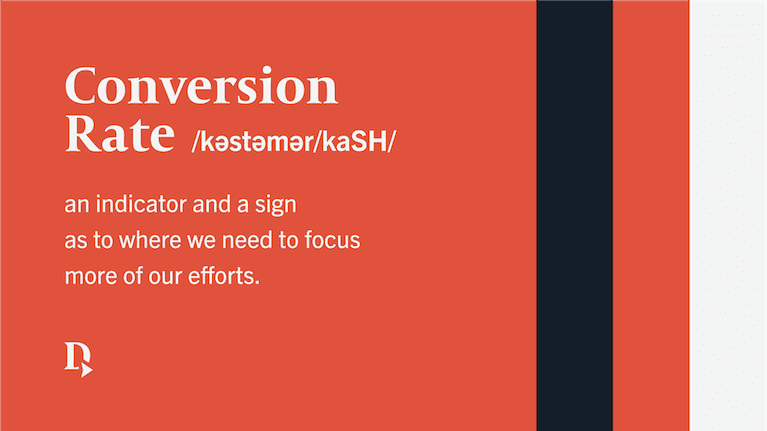
Conversion rates allow you to look at what levers you can pull that drastically affect the conversions and opportunities you’re generating.
Search Impression Share
Lastly, don’t forget about the search impression share.
If your company is driving revenue, it’s critical you’re showing your ads to the right people as often as possible.
If your cost-per-opportunity makes sense and you approve of your conversion rate, it’s essential you focus on search impression share. Ensure that you’re showing these ads as often as possible and that the right budgets are locked down.
Maybe, you’re showing ads too often because they have a much higher cost-per-opportunity than others. This means you need to reallocate spend!

Search impression share should be aligned with cost-per-opportunity. This way, you’re spending money where you’re making the most. As simple as it sounds, it’s an area that’s often overlooked.
9 B2B Marketing KPIs You Should Care About
In closing, there are nine B2B marketing KPIs you need to keep in your back pocket:
- Opportunities created
- Customer cash
- Conversions
- Organic traffic cost
- Referring domains
- Keywords in the top 5
- Cost-per-acquisition
- Conversion rate
- Search impression share
Next, get started setting up proper event tracking in your marketing campaigns.
Need help? You know you can reach out to us. If you have any questions, don’t forget to leave a comment below!
-
CEO Garrett Mehrguth
Did you enjoy this article?
Share it with someone!
